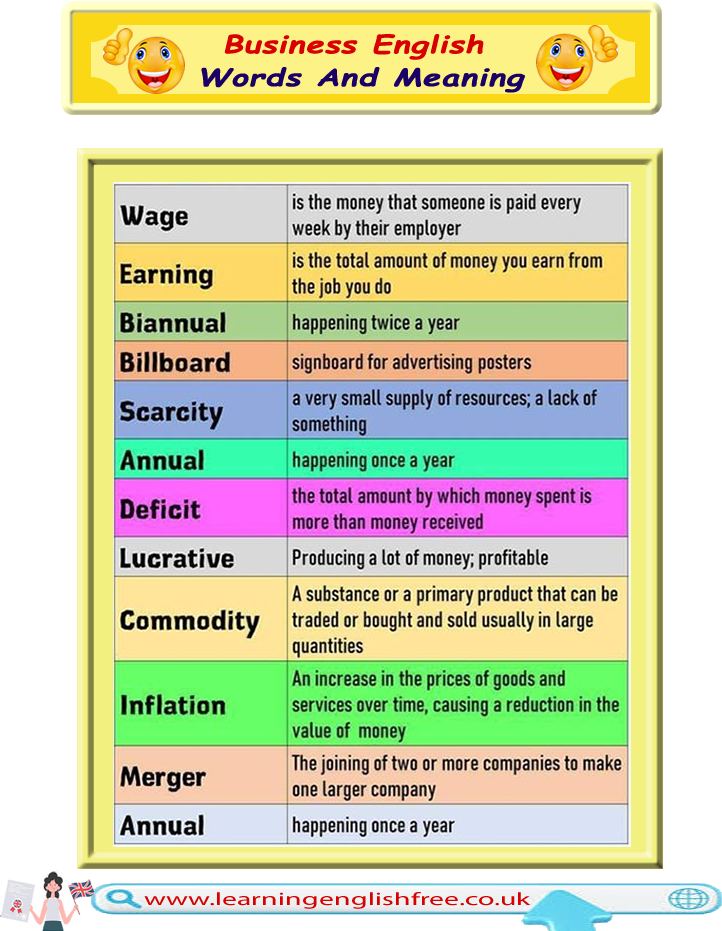
Exploring Business English: Vital Vocabulary for Success
Entering the world of business English can be akin to navigating a complex maze for ESL learners. The language of commerce is not just about transactions; it's the foundation of global communication, negotiation, and understanding in the professional sphere. This lesson is dedicated to demystifying this language, focusing specifically on crucial vocabulary that forms the backbone of business communication.
By the end of this tutorial, you will not only familiarise yourself with these essential terms but also apply them confidently in your professional interactions. We'll explore the nuanced differences between words that often confuse learners, like "wage" and "earnings," and dissect terms that are pivotal to understanding the economic environment, such as "inflation" and "deficit."
This introduction precedes our segment on 'Useful Vocabulary for Business English,' where we'll delve into definitions and contextual examples. The objective is clear: to equip you with the language tools needed for effective and proficient business communication. Let's embark on this journey of linguistic enrichment.
Useful Vocabulary for Business English
-
Wage
- Meaning: The money that someone is paid every week by their employer.
- Example: John's weekly wage was enough to cover his living expenses and a little extra for savings.
-
Earning
- Meaning: The total amount of money you earn from the job you do.
- Example: Her earnings from the freelance projects significantly boosted her monthly income.
-
Biannual
- Meaning: Happening twice a year.
- Example: The company's biannual performance review helps in assessing the progress and areas of improvement.
-
Billboard
- Meaning: A large outdoor board for displaying advertisements.
- Example: The new perfume advertisement on the billboard near the highway is quite eye-catching.
-
Scarcity
- Meaning: A very small supply of resources; a lack of something.
- Example: The scarcity of skilled workers in the industry has led to increased wages.
-
Annual
- Meaning: Happening once a year.
- Example: The annual general meeting is scheduled for the first week of December.
-
Deficit
- Meaning: The total amount by which money spent is more than money received.
- Example: The company has been operating at a deficit for the past two quarters.
-
Lucrative
- Meaning: Producing a lot of money; profitable.
- Example: Investing in real estate has proven to be a lucrative decision for many.
-
Commodity
- Meaning: A substance or a primary product that can be traded, bought, and sold, usually in large quantities.
- Example: Oil is a crucial commodity in the global market.
-
Inflation
- Meaning: An increase in the prices of goods and services over time, causing a reduction in the value of money.
- Example: The recent spike in inflation has made everyday goods more expensive for consumers.
-
Merger
- Meaning: The joining of two or more companies to make one larger company.
- Example: The merger between the two leading tech companies took the industry by surprise.
Summary and Takeaways
Self-Practice Exercises: To solidify your understanding of today's lesson, try creating sentences with each vocabulary word discussed. This practice will help contextualise the words and aid in their retention.
This lesson on Business English vocabulary serves as a cornerstone for ESL learners aiming to thrive in the professional realm. Understanding and using these terms accurately can significantly impact your business communication, making it more effective and nuanced.
Key Phrases to Remember: "Wage vs. Earnings," "Biannual Events," "Market Scarcity," "Annual Reports," "Operating at a Deficit," "Lucrative Investments," "Global Commodities," "Inflation Rates," and "Corporate Mergers." These phrases encapsulate the essential concepts covered and are pivotal for any business-related discussion.
Tips for Remembering: Associating words with pictures or scenarios in your mind can greatly aid memory. For instance, imagine a billboard advertising a luxurious car to remember the term "billboard." Sticky notes with words and their meanings around your workspace can also serve as constant reminders.
We encourage you to share this platform with peers and visit our Facebook page at www.facebook.com/learningenglishfree.co.uk for more lessons and tips. Engage with our community, ask questions, and continue your journey in mastering Business English.
